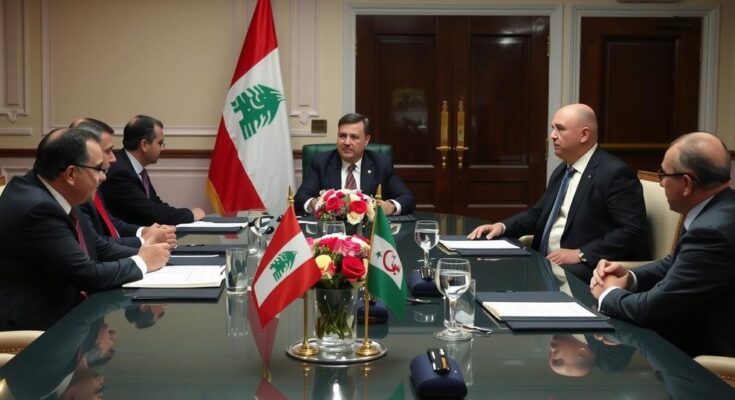Lebanese Prime Minister Najib Mikati is set to visit Syria shortly amid rising border tensions following a recent clash that left five soldiers injured. This visit coincides with new entry restrictions imposed by Syria on Lebanese nationals. Additionally, the Lebanese army is deploying deeper into southern Lebanon as Israeli troops withdraw under a ceasefire agreement, highlighting ongoing military adjustments in the region.
Lebanon’s Prime Minister Najib Mikati is set to visit Damascus in the near future, marking the first trip since Hayat Tahrir al-Sham (HTS) took control in Syria last month. This announcement was made by Information Minister Ziad Makary following a cabinet meeting. The visit arrives shortly after Syria imposed stricter entry regulations on Lebanese citizens after a confrontation that left five Lebanese soldiers injured in a border clash with Syrian militants. The new restrictions require Lebanese individuals to obtain a visa or have a Syrian spouse or child for entry, contrasting with previous protocols allowing entry with merely a passport or ID card.
The backdrop of this anticipated visit includes serious political tensions among Lebanese factions regarding relations with Damascus, particularly due to the involvement of Hezbollah in the Syrian civil war alongside Bashar al-Assad’s forces. Mikati reportedly discussed bilateral relations and the recent border incident during a phone call with Syrian leader Ahmed al-Sharaa, who has extended an invitation for an official visit. Notably, al-Sharaa has assured that Syria will not infringe upon Lebanon’s sovereignty.
In the south of Lebanon, the Lebanese army is advancing into deeper regions as Israeli troops carry out a gradual withdrawal dictated by a ceasefire agreement established in November. The army has stated that it is deploying to towns near the Israeli border, an operation coordinated with the United Nations peacekeeping force in the region. This military movement follows a truce that ended extensive cross-border assaults between Hezbollah and Israel, aiming to stabilize the situation after significant conflict, including a catastrophic war that led to the deaths of over 3,700 Lebanese citizens and left more than a million displaced.
The Lebanese forces’ deployment and Prime Minister Mikati’s upcoming visit to Syria reflect ongoing regional dynamics that merit attention. The evolving relationships between Lebanon and Syria, coupled with the military strategies implemented in the south, are critical as Lebanon navigates the multifaceted challenges it faces today.
The recent announcement of Prime Minister Najib Mikati’s upcoming visit to Syria occurs within a complex framework of regional politics and security issues. Since the onset of the Syrian civil war, Lebanese political factions have held divergent views regarding relations with Syria, especially after Hezbollah’s direct involvement alongside the Assad regime. Recent clashes at the border underscore the volatility of the situation, leading to the imposition of stricter travel regulations by Syria on Lebanese nationals. The Lebanese army’s deployment into the south amid the Israeli withdrawal further illustrates the delicate balance of military and political power in the region, particularly in light of the ceasefire brokered by the United States and France.
In summary, Prime Minister Najib Mikati’s forthcoming visit to Syria signifies a critical moment in Lebanese-Syrian relations amid heightened border tensions and shifting military dynamics. The introduction of new entry restrictions by Syria highlights the seriousness of the ongoing issues stemming from past conflicts. Concurrently, the Lebanese army’s movements into the south serve to reinforce national security as Israel withdraws. These developments will have significant implications for Lebanon’s political landscape and its foreign relations moving forward.
Original Source: www.newarab.com




